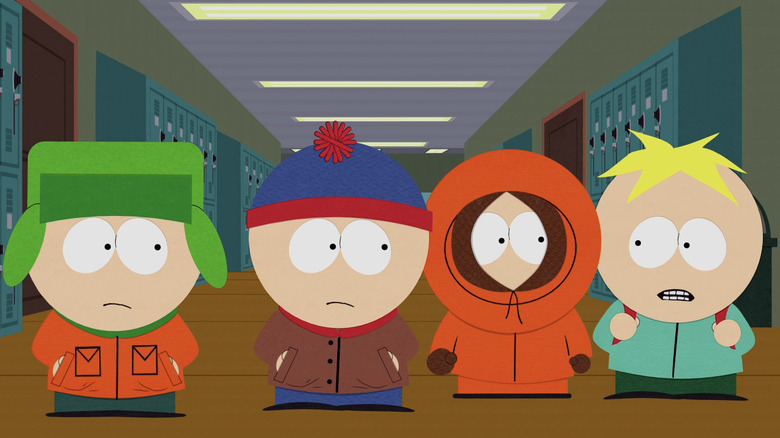Why Season 19 Of South Park Ended Up Becoming Serialized
"South Park," one of television's raunchiest and most notorious adult animation series, infamously parodies our own world in several outlandish ways. The series employs a thrilling way of running production that keeps the creators and crew on their toes. The comedy also often resists telling stories that bleed into one another and prefers those that are kept to a singular episode. However, "South Park" surprisingly embraced the serialized style in Season 19 and continued doing so in unconventional ways.
To celebrate the 20th anniversary of the series, creators Trey Parker and Matt Stone revealed to Vanity Fair how they unintentionally stumbled upon serialization. Ironically, their lack of planning led to a more interconnected season with hilarious parallels to the events leading up to the 2016 election. This involved Mr. Garrison (voiced by Parker) becoming a Donald Trump caricature, with outrageous statements and an orange face to complete the look. It also introduced the new character Peter Charles, aka P.C. Principal (also voiced by Parker), who reflects the tense political times in a hysterical way.
With Vanity Fair, the creators talked about how the story arcs naturally unfolded, which resulted in the continuous storytelling they usually avoid. They asked Parker and Stone if they intended to continue this trend for Season 20, which resulted in some surprising insights.
The creators were surprised how well serialization worked for South Park
Given their previous aversion to serialized storytelling, creators Trey Parker and Matt Stone were increasingly impressed with the results in Season 19, as they told Vanity Fair. Parker prefaced by saying they didn't intend to make Season 19 that way, and they took a similar approach with Season 20. "Especially last season, we really fell into it. It's not like we sat there and planned things out—and in fact, it's really interesting, we made a conscious decision last season to not plan as much as we usually do," he said.
The lack of planning led to more interweaving stories, especially with P.C. Principal, as Parker explained how the new form worked. "While we were making the first episode, we were like, 'O.K., at the end of this, P.C. Principal dies, and then we'll figure out what we do next week; it'll be totally different.' Then we're like, 'Oh, let's keep him around.' The next show wasn't really related, but as we did it we were like, "Oh, we can kind of relate it this way,'" Parker explained.
Parker continued by restating that this is not their usual mode of storytelling, but the success was undeniable. Stone agreed and added, "While you're doing the first episode, you go, 'Oh, this is really working. Let's let this be the thing that slides through to the next episode.' So we're reacting to what is working the week before, instead of having some grand design." He finished by noting the bigger picture usually unveils itself as they progress throughout the season with their unorthodox methods. Parker even joked about bringing in a showrunner to help with this style before suggesting it may actually disrupt their flow, and then applauded their ability to adapt at the moment.

